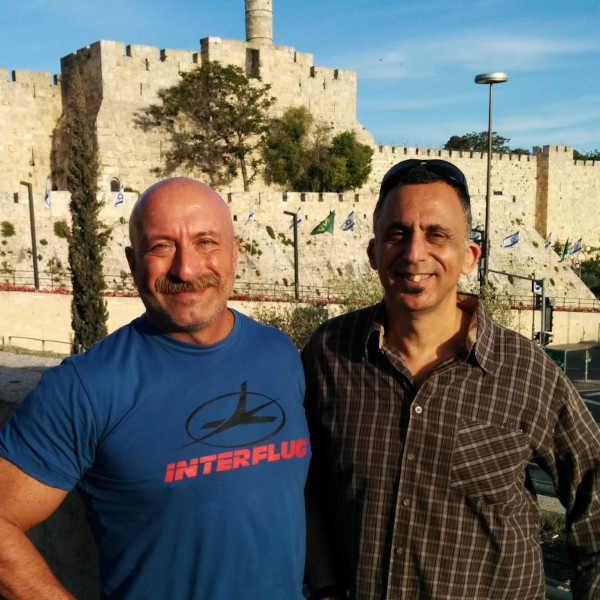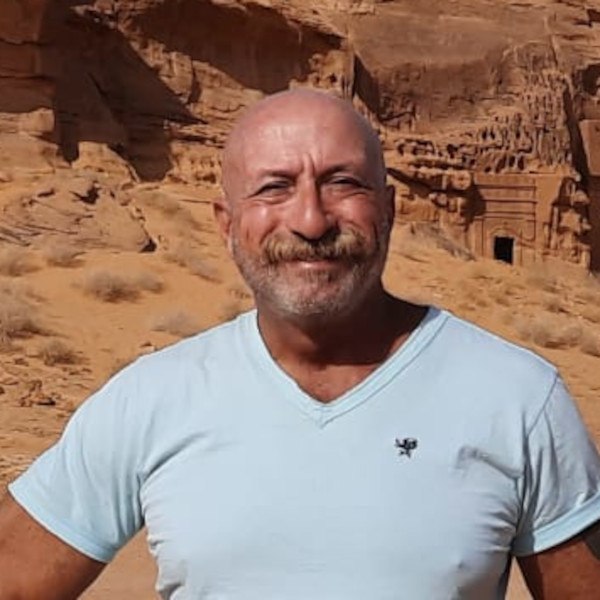Interviews with Olim
Each month, we interview an oleh or olah for our newsletter.
We invite you to read the stories of LGBTQ+ people who have made Israel their home.
"I've kept the American-Jewish values that I was brought up with in NY, but have combined them with the Israeli chutspa that one needs to survive here."
Interview date: August 2016
Update: August 2022. Scroll down for update.
Q. Where were you born and where did you grow up?
A. I was born and raised in Brooklyn, New York. My parents and grandparents were born there also.
Q. At what age did you come out? And how did it go?
A. To be honest, I never came out. I was always just me. I always acted naturally and did was was right for me. I figured either people would like me or they wouldn’t. During my teenage years, I lived with my grandparents (my mother passed away when I was young, and I was estranged from my father for most of my childhood). I made the conscious decision of not discussing the issue with my grandparents, as I felt that there was no point in trying to explain it to elderly people that were raised with certain traditional thoughts. (Thinking back, it was my grandmother that introduced and took me to Broadway musicals, and Bloomingdale’s men’s dept, and who explained the difference between a local barber shop and a “hair salon.” She bought me a “travel hairdryer” when I travelled overseas after graduating college. Grandparents evidently understand more than they let on. I was open to my brother and sister, aunts and uncles – and they totally accepted me.
Q. Were you involved at all in the LGBT community back home?
A. As a teenager getting acquainted with the NY gay scene, I often enjoyed a beer on Christopher Street, the phenomenon of the Riis Park gay beach (remember this was the mid 70s) and I visited the Gay Activists Alliance in the old Firehouse building (until the landmark was burnt down) and met many of activists of the day. Although too young to really grasp the movement that was building, I heard many of the pushers and shakers of the 1970s speak of gay rights, equal rights, and that we have our place to play in society. I was so fortunate to meet wonderful people at CBST (New York’s LGBT synagogue). I met a great group of “older” guys there (I was about 17, they were about age 30). They were professionals (teachers, lawyers, etc) and through them I learned that my life as a gay guy can include a career, hobbies and interests, cultural activities, running a household, planning and enjoying vacations, and having an active and healthy social life – all in the framework of being a gay man. (At the time, marriage and raising a family was not on the cards).
Q. How long since you made Aliyah?
A. I arrived to Israel in the summer of 1981. My plan was to stay here until June 1982 and then return to NY.
Q. What is your involvement (if any) in the LGBT community in Israel?
A. Prior to leaving NY, all of my acquaintances at CBST told me one thing… when you get to Tel Aviv, look for Asher Maayan. He’ll get you in contact with the community. I got here not knowing anyone. My first time at the Hilton Beach I asked some locals if they knew Asher, and indeed they did. Asher was one of the founders of the Aguda (known then as the SPPR). Originally from Philly, he had made aliyah a few years earlier. He was a licensed tour guide here in Israel and was well connected with the community. Networking was his middle name. Asher was at the forefront of pushing forward the LGBT agenda for understanding and equal rights. Together with friends (including Avi, who was soon to become my life partner), Asher would travel around the country to schools (whichever would accept them) and explain to them what it means to be a gay man, and why the general population needs to put their preconceptions behind them and embrace this sector of the population. (Asher used to speak often about how shocked people would be when he would explain that we are your teachers, doctors, nurses, lawyers, TV news reporters, neighbors, plumbers and furniture makers).
Q. Did you move here on own or with family/friends/significant other?
A. I moved to Israel on my own. I came in the summer of 1981 and planned to return to NY by June 1982. During that time I met Avi and decided to remain here and build a life together with him.
Q. How has it gone so far?
A. Israel is my home – I have lived here many more years than I lived in NY. I like to think that I’ve kept the American-Jewish values that I was brought up with in NY, but have combined them with the Israeli chutspa that one needs to survive here. It’s a balancing act, but I think I do it well.
Q. How is your Ivrit?
A. My Hebrew is fine. I will always have an accent, but often I find my grammar is better than Israelis’. I realized soon after my arrival to Israel that if I want to live here as “one of the guys” and not always thought upon as “the American”, I needed to learn the local lingo well.
Q. What has been your biggest challenge?
A. My biggest challenges, just as anyone else here is learning how to deal with local bureaucracy and accepting the things that are not in my control to change. I’m sure these are challenges are the same all over the world.
Q. How do you perceive the Israeli LGBT community?
A. I have great admiration for the young people in the Israeli LGBT community. They are proud, stand upright, know their rights and know their responsibilities (social, political, community). It makes me proud to hear many of them speak about the issues of our day with such knowledge and dignity. As with any community, we have plenty to improve upon, but we’re in a good place. If I must criticize some aspect of the community, I would say it’s the lack of respect/acknowledgment to those who came before them. We could not be where we are today had it not been for the gay and lesbian pioneers of the 1970’s, the first meetings of the SPPR, the organizers of the first parades and organizers of the first parties. The trailblazers today seem to think it all started when the Tel Aviv Gay Center opened in Gan Meir and that little happened before that.
Q. How is being gay in Israel different to back home?
A. I can’t really say how being gay in Israel is different that being gay anywhere else as I’ve lived here my adult life. As our community is smaller, I’ve had the opportunity stand up and play a role where I thought I could help. For example, not too many years back, Kibbutz Tuval used to produce an annual Tu B’Shvat tree planting event for the LGBT community. It was a wonderful community event. I influenced my company to contribute a bus to/from the event each year, so that participating in the event was accessible to more people. After the Bar Noar shooting in 2009, my company quickly came forward and offered assistance. We purchased a special wheelchair for one of the young guys that was shot and left without the ability to walk. Back in 2005, I helped organized the World Pride event in Jerusalem – a very controversial event at the time. In 2006, Avi and I (together with four others couples) took the Israeli government to court and sued them so that they would recognize our marriage (officiated in Toronto). Our Supreme Court hearing is the reason that same-sex couples married overseas can register here as married couples. I mention these items because, given the compactness of our community, regular folks like me (and many others) have the opportunity to stand up and make a difference. I’m not a lawyer nor a professor, just another guy trying to be a good citizen and make life a bit better for those around me.
Q. If you were making aliyah now, would you do anything differently?
A. I wouldn’t change a single thing. It’s been a great run. I’ve been so fortunate, mostly because right from the start I met Avi. We’ve shared a wonderful exciting life together and I hope it continues for a long time to come.
Russell

Our Newsletter
Sign up if you would like to receive a monthly email listing events of interest to LGBT English-speakers in Israel, an interview with an oleh/olah and other useful information.
Want to be interviewed?
Complete the form below and we will get back to you.
"[Israel is] a mosaic of many heritages that I love to immerse into and hear different views, thoughts, attitudes"
Interview date: August 2022
Q. Has your life changed since we last interviewed you? If so, how?
A. On the surface, it sounds like a very straight forward question. With the onset of the planet’s Corona experience, we have learned so much about ourselves, our vulnerability, and how others take a worldwide pandemic and are able, through subtle and not so subtle means, to manipulate others to believe and not believe all kinds of absurd things. I have learned that I must prioritize what is urgent and what is important. I’ve learned to appreciate more what I have and who I have in my life. Not that I didn’t before… but these past 2 1/2 years have really put it in your face. Both of us (my partner Avi and I) were without work for 2 years – it’s incredible how we learned quickly to adjust our lifestyles to the new reality, and come through just fine.
Q. Are you still living in the same town/city to which you made aliyah? Or have you moved around?
A. Living at the same address.
Q. Are you working in your desired industry/area? Do you have any advice on job hunting, job applications and interviews?
A. Despite all that happened since March 2020, I am still in the tourism industry. On the professional front, I see that the world has changed drastically. When I began my career in tourism, it quickly became clear to me that (although I’m far from a medical doctor) my job is not 9-5. I work with people and they have questions, suggestions, complaints, and need clarifications all the time. I cannot close my phone at 5pm if my clients have questions at 8pm. If you are not interested in a people-to-people job… tourism is not for you. I find that younger people are less inclined to enter fields of work that involve commitment on this level (I’ll be happy to learn if I’m mistaken).
Q. How is your Ivrit now? What sites or apps would you recommend that helped you?
A. My Ivrit is fine. No change
Q. Have you discovered any off-the-beaten-track locations that you’d recommend to others?
A. In December 2021, I finally got to do a tour that I’ve been planning since 2006. I spent 21 days in the Kingdom of Saudi Arabia. It was absolutely incredible on every front. I started with seven days of camping in the north of the Kingdom – the theme of the program was “in the footsteps of Moses”. All one has to do is look at a map and see that if Moses and the Israelites left Egypt, crossed the Sinai and the Red Sea… they wound up in the place that is today Saudi Arabia. I saw where they crossed the Red Sea, the place of the Golden Calf, the mountain where Moses received the Ten Commandments, Moses Springs, the site where he met Zippora. We saw incredible Nabatean tombs, and outdoor library carved in stone (with 7 alphabets including Hebrew). I then proceeded to Khaybar (which was a Jewish city for centuries), Medina, Jeddah and Riyadh. Trip of a lifetime for sure!
Q. Do you feel that living in Israel has changed you? If so, how?
A. For sure living in Israel has changed me. From morning til night, we are exposed to different things than our peers overseas. My “morning headlines” are different than those of London, New York or other places – and it certainly affects the way we think, behave, and react to world events.
Q. Do you have any practical advice for new olim/olot or anyone who’s considering making aliyah?
A. Israel is an incredible place to live. Great people (who are convinced that they know the best way to do everything), many wonderful communities of people from a wide array of places. It’s not a “melting pot”, but a mosaic of many heritages that I love to immerse into and hear different views, thoughts, attitudes. There is one word that you must learn how to spell frontwards and backwards: Resilience! Don’t live your life through the news, through what you hear on TV, through rumors… live your life and keep all that static news on the sidelines. Israel is a great place to live – partly because of us “olim” that make it that way.
Russell

Our Newsletter
Sign up if you would like to receive a monthly email listing events of interest to LGBT English-speakers in Israel, an interview with an oleh/olah and other useful information.
Want to be interviewed?
Complete the form below and we will get back to you.


